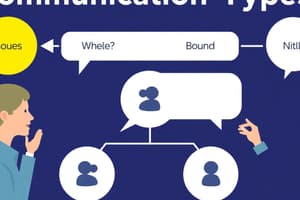Podcast
Questions and Answers
What is communication?
What is communication?
The exchange of ideas, opinions, and information through written or spoken words, symbols, or actions.
What are the elements of an effective communication process? (Select all that apply)
What are the elements of an effective communication process? (Select all that apply)
- Feedback (correct)
- Noise
- The Message (correct)
- The Sender (correct)
What is the role of the sender in the communication process?
What is the role of the sender in the communication process?
The sender is the person who initiates the communication processes.
What does encoding a message involve?
What does encoding a message involve?
What types of channels can be used for communication?
What types of channels can be used for communication?
What is the purpose of feedback in the communication process?
What is the purpose of feedback in the communication process?
Noise is an element that enhances the communication process.
Noise is an element that enhances the communication process.
What is meant by decoding in communication?
What is meant by decoding in communication?
Which of the following describes formal communication?
Which of the following describes formal communication?
Flashcards are hidden until you start studying
Study Notes
Communication Overview
- Communication is foundational to human life and facilitates job performance and emotional expression.
- Even minor life events require effective communication for organization and understanding.
Historical Context
- Early communication was primarily oral; the Greeks developed a phonetic alphabet.
- The first libraries emerged from advancements in written communication.
- In Communist China, communication challenges prompted the establishment of postal services, later adopted by Rome.
- The invention of paper and the printing press in China significantly improved communication methods.
Definition of Communication
- Communication is the exchange of information regarding needs, desires, and perceptions between individuals.
- It can be intentional or unintentional, utilizing both conventional and unconventional signals in various forms.
- Effective communication requires mutual understanding of the message between the sender and receiver.
Elements of the Communication Process
- Sender: Initiates the communication process.
- Message: Content shared, which can range from requests to statements.
- Encoding: The sender translates the message into a communicable form using words, images, or gestures.
- Media/Channel: The method used to transmit the encoded message (e.g., email, telephone).
- Decoding: The receiver interprets the message based on their knowledge of the encoding used.
- Receiver: Individual who receives and decodes the message.
- Feedback: The response from the receiver to the sender regarding the message.
- Noise: Any interruption or interference that hinders effective communication (e.g., poor phone connection).
Steps in the Communication Process
- Develop an idea to be communicated.
- Encode the message effectively.
- Select an appropriate channel for sending the message.
- Send the message through the chosen channel.
- The receiver gets the message and decodes it.
- Provide feedback if necessary to the sender.
Types of Communication Processes
- Formal Communication: Uses official channels and may be verbal, non-verbal, or written; includes:
- Vertical Communication: Information flows between different levels of management and employees.
Studying That Suits You
Use AI to generate personalized quizzes and flashcards to suit your learning preferences.




